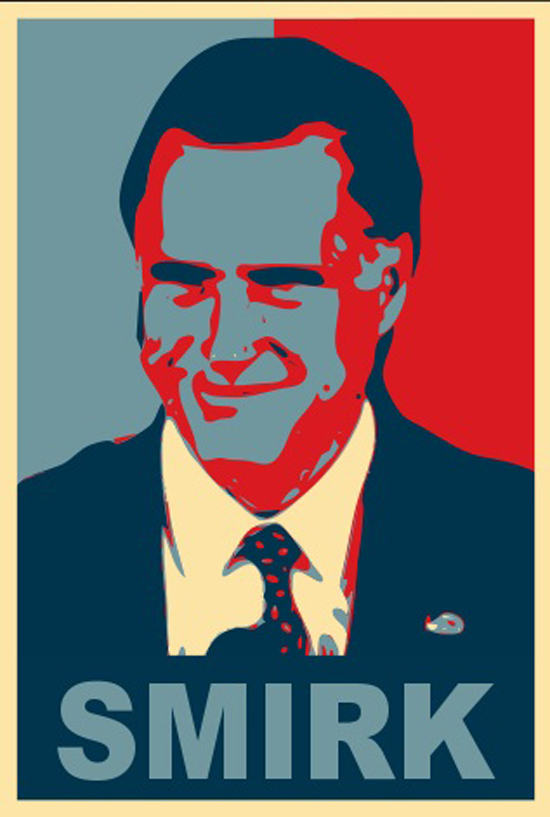
Tactical Animal: Regarding The Pain Of Being Right…Or More Reasons Mitt Romney Will Never Be Your President4
Posted In Activism,Blog,Politics
by ChrisSick
In which we provide a brief update on the ongoing self-destruction of one Willard Mitt Romney.
Let me take you a bit behind the curtain, dear reader. We have a bit of a turnaround time here at the ol’ SG Blog, so on Sunday night I wrote:
“….as the Obama convention bounce has transitioned, gradually, to the Obama lead, it becomes more and more clear that Mitt Romney, as Joan Walsh said, will never, ever be your President. As this reality sinks in at the headquarters of Team Mittens, we will see ever more bizarre, surprising, and desperate moves from the campaign.”
Writing Sunday for publication Tuesday means that I wrote that, went to bed and woke up Monday to read:
“It is a brave new day for Mitt Romney. His campaign is laying out a bold new strategy, one in which it will make a dramatic new turn toward…something!
The something will not actually be new, but it will feel new to lots of people, Romney campaign adviser Ed Gillespie told reporters Monday morning. But that’s the problem with the current, much-hyped Romney campaign strategy reboot: It’s not a new strategy at all.
‘This is reinforcing,’ Gillespie said on the Monday conference call, adding, ‘We’re not rolling out new policies so much as making people understand when we say things, here’s how we’re going to get them done. Here are the specifics. We think there’s a demand out there for that.’”
— Molly Ball, The Atlantic, “Romney’s ‘New’ Campaign Strategy isn’t Actually New,” September 17, 2012
So the Romney campaign has a great new strategy, they’re finally going to tell us how they plan to slash taxes for the wealthy, increase military spending, and somehow pay down the debt despite reduced revenues and increased spending. I don’t know about you, but I’m excited to hear this. Mostly because whenever Ed Gillespie speaks, my Intrade shares for President Obama’s win become that much more valuable.
It’s an exciting turn for the Romney campaign, and — to the rest of us — a patently obvious attempt to change the conversation from, among other failures, a long Politico article that describes the Romney Campaign as, more or less, a complete fucking shambles:
“As mishaps have piled up, [top Romney advisor Stuart] Stevens has taken the brunt of the blame for an unwieldy campaign structure that, as the joke goes among frustrated Republicans, badly needs a consultant from Bain & Co. to straighten it out.”
These sort of articles — rampant with finger-pointing, blame-gaming, and the like — are, naturally, pretty common affairs. Typically, though, they wait until after the goddamn election is over before they start the mad scramble to blame one another for their collective failure to get their candidate elected.
I knew, when I wrote Sunday that we were seeing the death throes of the Romney campaign, and that things were going to start getting weird. By which, I mean, more weird than “Lemon. Wet. Good.”
But, the icing on top of the shit-cake of sadness for the Romney campaign began to break yesterday, when video surfaced via Mother Jones of Romney speaking at a private fundraiser earlier this year.
“There are 47 percent of the people who will vote for the president no matter what. All right, there are 47 percent who are with him, who are dependent upon government, who believe that they are victims, who believe the government has a responsibility to care for them, who believe that they are entitled to health care, to food, to housing, to you-name-it. That that’s an entitlement. And the government should give it to them. And they will vote for this president no matter what…These are people who pay no income tax.”
This is Mitt Romney telling you how he really feels and you can add this to what is now a long and growing list of The Moment(s) Mitt Romney Lost the Election. November is coming like a bad hangover, there’s 48 days until election day as of this writing, and in 49 days we’ll be severely spoilt for choice about when, exactly, Mitt Romney Lost the Election.
But this week will surely be in the top contenders, and in closing, I’ll let a much more talented writer than myself, but just as much at a loss for words as I am, sum it up:
“I don’t really know what to say about a man who believes that one in two Americans believe that ‘the government has a responsibility to care for them.’ Romney is right. Obama does start off with a big lead, but that is because he would never enter the race conceding that fully half the country was beyond his reach. A politician conceding that sort of field position is an embarrassment to himself, and his political party.”
— Ta-Nehisi Coates, The Atlantic, “The Contemptuous Elitism of Mitt Romney”, September 18, 2012
Related Posts
Tactical Animal: Have You Got Yourself The Belly For It?
Tactical Animal: Sorry Folks, Election’s Over, Donkey Out Front Shoulda Told Ya
Tactical Animal: Politics In The Post-Truth Era
Tactical Animal: Now We’ve Got Ourselves A Race







